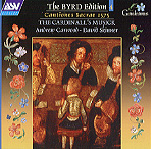If this were back in the LP era I’d say just “drop the needle” anywhere on this recording and your ears and soul will be richly rewarded. This fourth volume in ASV’s “Byrd Edition” features first rate performances of the 15 motets Byrd contributed to the artistically and historically important collection of “sacred songs” known as Cantiones Sacrae of 1575, which was published jointly by Byrd and Thomas Tallis. Of course, the music is some of the most profoundly beautiful ever written for a cappella voices, but to make the music work, it takes a special breed of voice–clear, unaffected, distinctive in timbre yet “blendable”–and singers who are completely at home with and sensitive to phrasing within and among parts. These singers (including early music veterans Carys Lane, Rebecca Outram, Caroline Trevor, and countertenor Robin Blaze) meet the highest standard of technique and stylistic awareness–and they never forget that this music is about something, and thus requires expression and feeling.
Besides expert engineering, there’s a very significant reason for the recording’s rich and warmly resonant vocal sound: Director Andrew Carwood and David Skinner, who prepared the performing editions used here and receives deserved credit on the disc’s cover, determined not to use the commonly adopted “modern” transpositions of these pieces, which generally raises the pitch a minor third. This not only dramatically changes the voice configuration, but also drastically alters the color of the ensemble sound. Thus, instead of the high soprano being the dominant voice, on this recording the highest part is taken by a slightly lower soprano/high alto voice, accompanied by darker-hued altos, tenors, baritone, and bass. This arrangement works to stunning effect, especially evident in cadences and final chords.
As Skinner points out in the informative liner notes, “there was no pitch standard in the 16th century” and therefore, practicality should take precedence over “dogma”. In keeping with practice during Byrd’s time, transposition (or not) should be determined by the vocal forces at one’s disposal and should enable singers to express themselves “in the optimum parts of their voices.” One word about the recorded sound: If you would never sit in the first 10 rows of a concert hall because you like an “airier” sonic perspective, you may find the miking here a little close. But with such well-matched, highly skilled singers, the more intimate setting quickly and comfortably establishes itself.
































